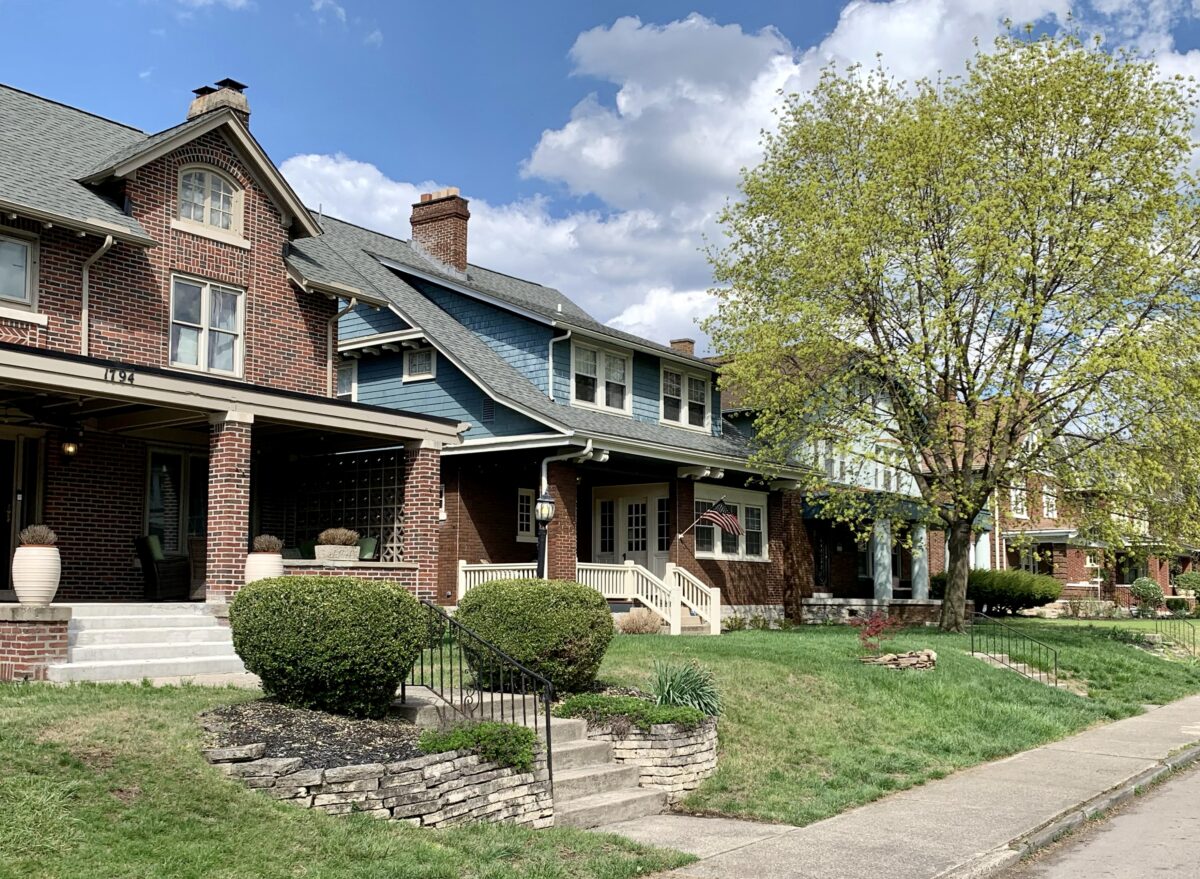Abe Zawodni and Crys Lappie bought their house in Franklin Park in 2017, drawn to the Near East Side neighborhood’s classic architecture, the proximity to the sprawling, 88-acre park with which it shares a name, and the character of its long-term residents, who the two said helped define the area for them.
“There’s good energy in the soil,” said Zawodni, who joined Lappie for a February interview at their home which rests on a quiet, tree-dotted block in the heart of the rapidly developing neighborhood. “People have lived here a long time, and there’s a lot of love and community.”
“We have some old families over here who have been here 50, 60 years,” Lappie said. “The neighbors always look out for each other. They’re out on their front porches, hanging out together. … When we were looking at houses when I was pregnant, I was like, ‘I want this house, because I love the neighbors.’ And there was no way to talk me out of it.”
In the six years the couple have owned their home, they’ve seen the area undergo a rapid change. In April 2022, the East Market food hall opened in the renovated Trolley Barn on Kelton Avenue, and in February the Columbus Brewing Company Beer Hall debuted next door. Long before either business opened its doors, Zawodni said real estate developers started to descend on the area, first purchasing all of the available empty lots on which to build, and then moving on to buying and flipping dilapidated houses.
As a result, home prices in the neighborhood have risen steadily, with the median sale price in Franklin Park registering at $389,950 in February 2023, according to the real estate company Redfin, compared with $250,000 in February 2020.
Lappie said she has watched this reality unfold from the rear window of her home. “There was a group of kids back here whose families didn’t have much, but neighbors would help out,” she said. “One thing about this neighborhood, it was not only diverse culturally but also in terms of [financial] class and how much money people had, and we’re losing that.”
According to three people interviewed, the increase in housing prices has been accelerated in part by investors who have purchased properties in the neighborhood and converted them into short-term rentals – taking apartments and homes off of the market for would-be permanent residents while driving up costs for buyers.
As the city and region welcome the population boom anticipated by the massive Intel development now taking root in Licking County, these problems are certain to intensify, stretching far beyond the Near East Side of Columbus. Even Granville, which might currently feel isolated from the issue, has already started to advance discussions related to short-term rentals, wary of potential pitfalls that could develop as Central Ohio’s population continues to swell.
Short-term rentals can impact everything from the quality of life for residents in a neighborhood – potentially facilitating parties that can generate excessive noise, exacerbating parking issues and on rare occasions even leading to violence – to the cost of the housing stock in an area.
“The profit available to short-term rental hosts inflates the sale prices of single-family homes, making those homes out of reach for those who would like to live there permanently,” said Matt Adair, who is a co-founder of Neighbors for More Neighbors Columbus and is currently working on his PhD in urban planning at McGill University. “This, in turn, contributes to the continuing financialization of housing – the accelerating shift of housing from something to live in to something to profit from.”
In a video comparing the profit potential of a short-term rental with a more traditional rental unit, real estate investor Austin Rutherford, who at one point owned multiple properties in Franklin Park, said listing a property as a short-term rental on Airbnb could potentially generate “two to three times” more monthly income than a monthly lease.
When mismanaged, however, these units can become nuisance properties, drawing noise complaints and worse. In January, Columbus police investigated the death of Clayden McNeil, 30, who was shot and killed at a property on Oak Street in Franklin Park that neighbors said Rutherford operated as a short-term rental. Rutherford also previously owned the property next door to Zawodnie and Lappie, which the two said he operated as a short-term rental beginning in mid-2019. (Rutherford replied to an initial email request for an interview, but did not reply to subsequent follow-ups and did not provide any comment.)
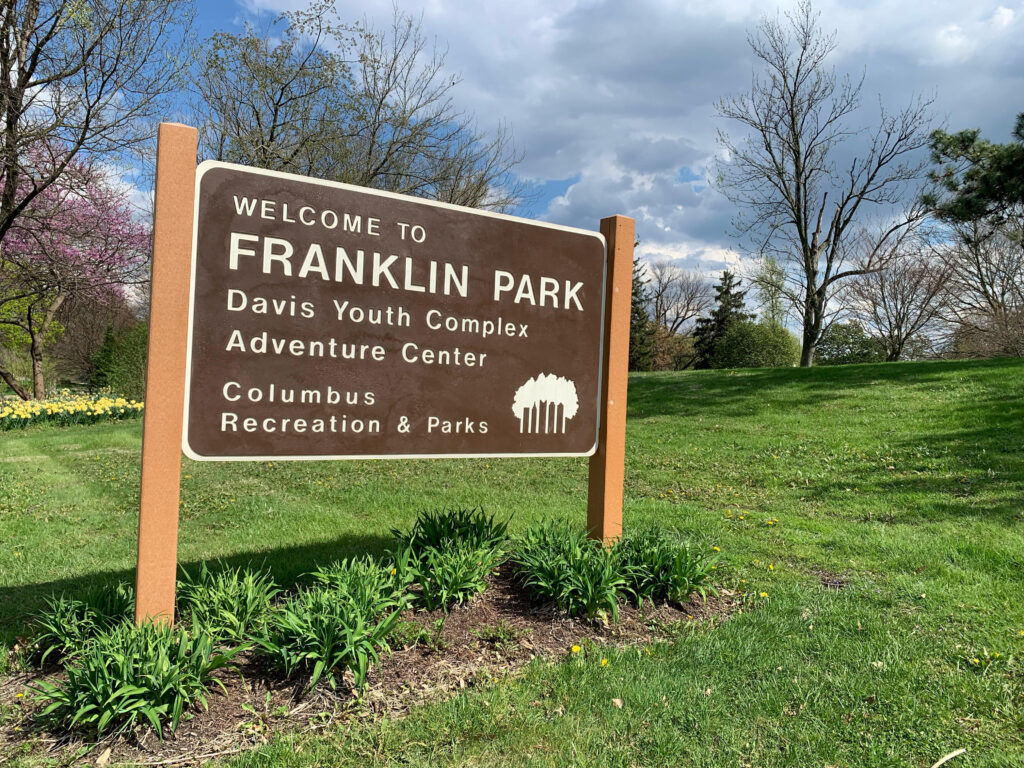
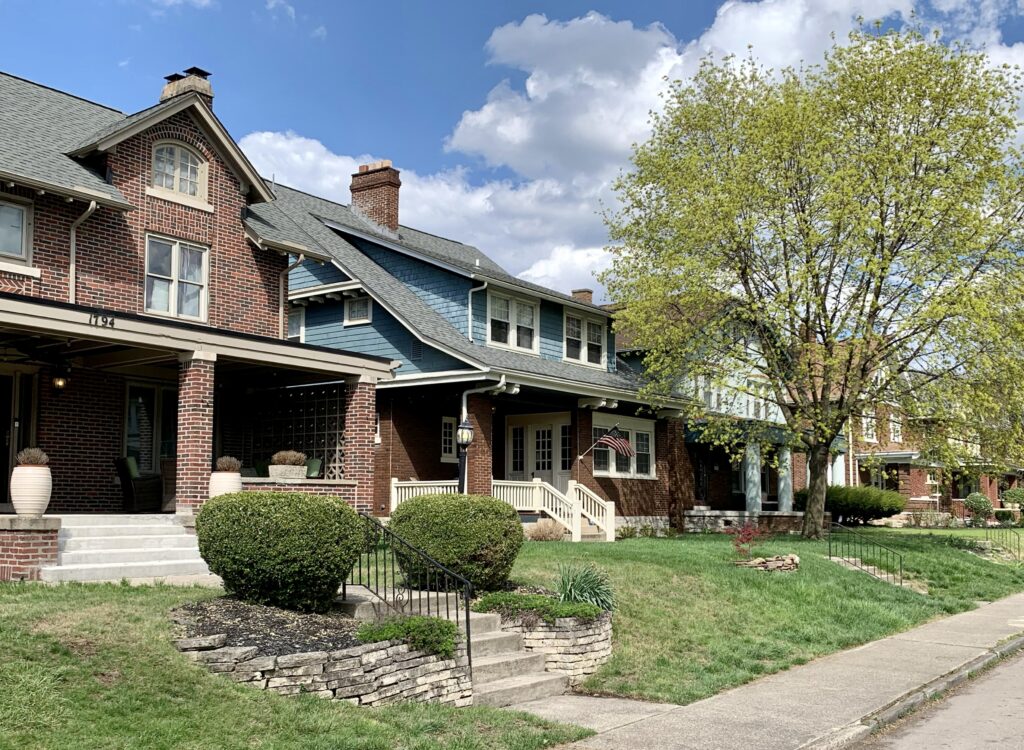
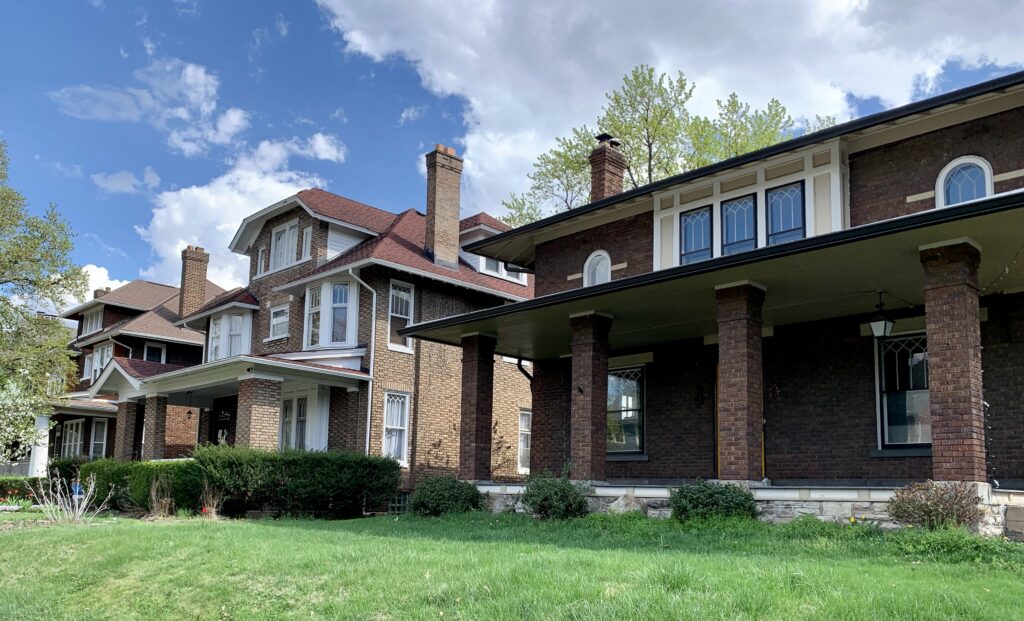
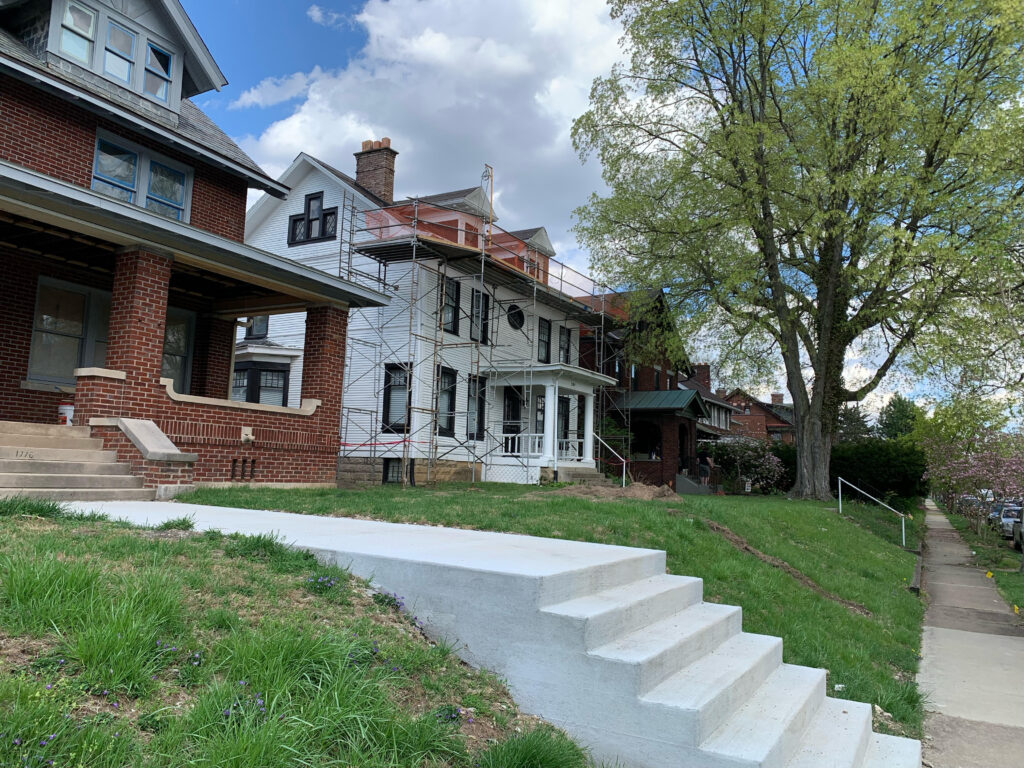
“Then through the pandemic, you could tell more and more people were renting it as a party house,” said Zawodni, who described a constant flow of new renters coming and going from the house next door, loud music playing at all hours, and a yard regularly strewn with beer cans and plastic cups. “Into 2021, there were instances when there were almost 50 people in the backyard.”
Kate Curry-Da-Souza, Chair of the Near East Side Commission, said many of the neighborhood’s issues with short-term rental units have arisen because property owners were not easily reachable when problems flared up. “Neighbors would really prefer to have that person-to-person conversation first, and then escalate only if necessary,” she said. “But when we have individuals who are investing, and who don’t have those ties to the neighborhood and aren’t responsive when there are safety concerns, that’s when it becomes more of an issue.”
Zawodni and Lappie, who converted the single-bedroom upper floor of their Franklin Park home into a short-term rental, described being open and communicative with neighbors as an essential part of the venture. “If one of our neighbors called us with any issue, we would immediately take care of the problem,” Lappie said.
Across the country, city and state officials have adopted different types of legislation designed to rein in short-term rentals. In 2019, Los Angeles passed a law making it illegal to rent out any property other than your own residence on the short-term rental market, effectively shutting investors out of L.A. In March, New Orleans passed strict new regulations that would limit the number of short-term rental properties to one per square block in residential areas.
Here in Ohio, Walnut Township trustees banned short-term rental services such as Airbnb, sparking lawsuits from property owners near Buckeye Lake, a popular in-state tourist destination. And Granville Village Planner Darryll Wolnik recently started to turn an eye toward short-term rentals, saying in a March interview that he plans to raise the issue with the Village Council in the fall.. “Currently, we don’t have a problem here,” said Wolnik, who allowed that the population boom anticipated by the Intel development could require the Village to be more proactive in the months ahead. “Every community is different and requires different attention to this issue.”
In Columbus, City Council has passed legislation to create a database of short-term rental properties, in addition to levying a hotel/motel tax on the operators, which eliminated a competitive price advantage short-term rentals previously had over the city’s hotels. The Council also adopted a “three strikes” policy aimed at nuisance properties, whose owners could have their short-term rental licenses revoked if authorities are called out to a property three times in response to neighbor complaints.
“During my four-plus years on Council, it seems every year new issuescrop up,” Columbus City Council President Pro Tem Rob Dorans said of short-term rentals.
At first, he said, the problem was with registration, as single-family homes, condos, or townhouses began essentially operating as a hotel with no way for the city to track them.
“I mean, there’s a reason that we regulate hotels the way that we do, and a reason why we zone them to be more appropriate for the neighborhoods they’re in. … I think really in the last six to 12 months, some light has [shined] on the negative aspects of some – not all – short-term rentals in certain areas of the city. And we’re really digging into what the next iteration of legislation could be to help fix some of those issues.”
Recently, the Near East Side Commission, which includes the Franklin Park neighborhood, drafted a proposal aimed at short-term rental regulation. The commission’s membership voted on and approved the proposal in early March, and Curry-Da-Souza said she planned to present it to City Council.
Among other recommendations, the proposal suggests placing restrictions on the number of short-term rental licenses available within a given zip code. It would also increase barriers to licensure, requiring operators to allow regular property inspections, while establishing limits on the number of occupants allowed on a property at a given time “in order to deter ‘party houses.’”
“The ways that short-term rentals impact a community are sort of unique to each neighborhood, and there are some areas that are having more problems than others,” Curry-Da-Souza said. “With this proposal, we wanted to come up with new regulations that would offer a bit more protection for neighbors than what is currently on the books.”
“One thing about this neighborhood, it was not only diverse culturally but also in
terms of [financial] class and how much money people had, and we’re losing that.”
-Crys Lappie
The proposal also recommends that tax-abated properties in the area not be eligible to apply for a short-term rental license unless the home is also owner-occupied.
“It’s not fair that right now someone can get a tax abatement and then rent the home out as an Airbnb, and it’s just money all day long,” Lappie said of the loophole exploiting the Residential Tax Incentives program. It was designed to offer buyers property tax relief as one means of spurring private investment in Columbus neighborhoods designated as Community Reinvestment Areas (CRA).
“And I think those frustrations are valid,” Dorans said. City Council recently amended the residential abatement program, he said, with changes that are set to go into effect later this year and would require an element of affordability in order for single-family homes to qualify for tax relief.
“This isn’t even like, ‘Hey, we need a study to tell us!’ When you go to the Near East Side, you can see that single-family home construction under tax abatements has driven some gentrification in that area. When you see a $500-600,000 single-family house built with a tax abatement, that points to the [legislative] changes we’re trying to make,” Dorans said.
Under the city’s new policy, if a single-family home fell within a Community Reinvestment Area and met the affordability requirement needed to qualify for a tax abatement, then the property could not obtain a short-term rental license.
Adair, from Neighbors for More Neighbors Columbus, said that cities also have to tread carefully when proposing legislation aimed at restricting short-term rentals – particularly in Republican-led states such as Ohio, where House Bill 563 already passed committee. If adopted, the bill would restrict the ability of townships, counties or municipal corporations to pass legislation aimed at curtailing short-term rentals.
“The short-term rental industry and local hosts want people to think they’re a mom-and-pop group of folks earning supplemental income to make ends meet,” Adair said. “Data shows this is a largely misleading narrative. Instead, the bulk of short-term rental profits are earned by professionalized hosts who own multiple units and have made a lucrative business out of displacing and preventing long-term residents.”
While multiple people interviewed referenced the impact of short-term rentals on rising home costs, Curry-Da-Souza said a neighborhood oversaturated with these units could also be impacted by a more general shortage of available housing. “It removes properties from the market, and that can be a challenge because we need places where people can live on a more permanent basis,” she said.
For his part, Dorans said he didn’t think Columbus had yet reached a tipping point where short-term rentals were having an appreciable impact on housing prices, and he countered that the increasing number of short-term rental units could also have slowed the construction of new hotels, leaving more potential land open for housing development.
“We’re not at the critical mass that you see in cities that are really dependent on the tourism industry – places like New York or New Orleans or Nashville,” he said. “But we’re also growing, and with things like Intel coming, there are going to be more and more people coming in. … So, again, these are all fair questions to begin to ask.”
Andy Downing is the editor of Matter News, a local, investigative, nonprofit news outlet in central Ohio. Additional reporting by Jack Wolf of The Reporting Project, the nonprofit news organization of the Denison University Journalism Program, which is sponsored in part by the Mellon Foundation.

